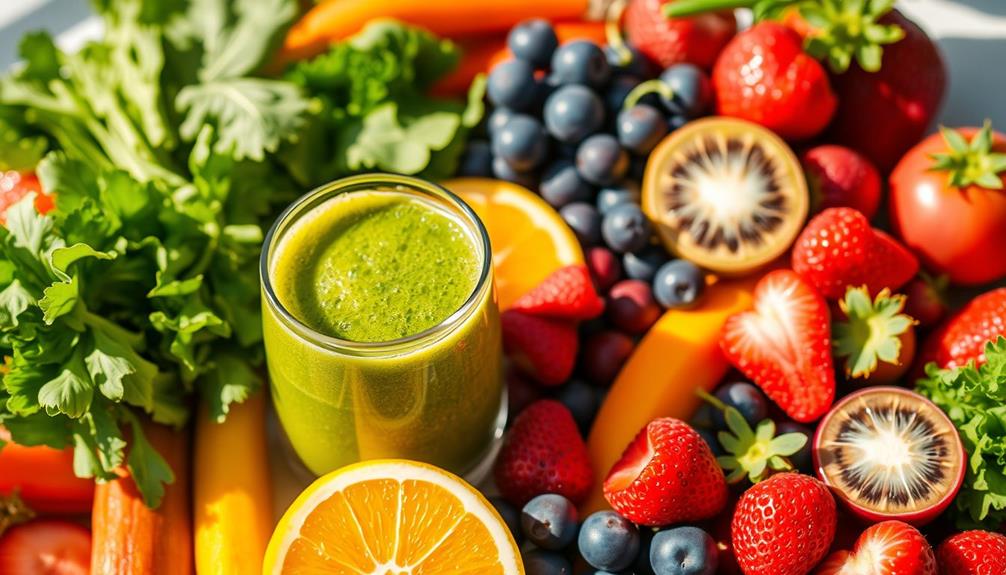If you eat raw food, you might experience increased energy and better digestion. Raw fruits and vegetables pack essential nutrients and antioxidants, which can boost your immune system. However, you could also face risks like nutrient deficiencies, particularly in protein, calcium, and vitamin B12, leading to fatigue and weakened health. Additionally, you may encounter digestive discomfort as your body adjusts to this change. There's also a chance of exposure to harmful bacteria, so food safety is vital. Curious about how to balance these effects and maximize benefits? There's more to uncover about this vibrant way of eating.
Key Takeaways
- Eating raw food can increase your intake of essential nutrients, antioxidants, and fiber, promoting overall health and immune function.
- A raw food diet may lead to weight loss due to its lower calorie content and high fiber, which promotes satiety.
- Initial digestive discomfort may occur as the body adjusts to a higher intake of raw foods and fiber.
- Risks include potential nutrient deficiencies, particularly in vitamin B12, protein, calcium, and vitamin D, which can impact energy and health.
- Consuming raw foods increases the risk of foodborne illnesses if proper food handling and washing practices are not followed.
Overview of Raw Food Diet
Many people are curious about the Raw Food Diet, which focuses on eating unprocessed, whole foods. This diet primarily consists of raw fruits and vegetables, nuts, seeds, and sprouted grains, with minimal heating—typically not exceeding 104-118°F (40-48°C)—to preserve nutrients.
One popular variation is the raw vegan diet, which excludes all animal products, while the raw omnivorous diet includes raw animal products alongside plant-based foods.
The raw food diet emphasizes the importance of meal preparation methods like juicing, blending, dehydrating, soaking, and sprouting to maximize nutrient intake. For instance, incorporating fresh vegetable juices can enhance the antioxidant content of your meals, promoting overall health and wellness beneficial for overall health.
Advocates of this lifestyle often report increased energy levels, weight loss, improved digestion, and a reduced risk of chronic diseases. However, it's essential to plan your meals carefully to avoid nutrient deficiencies, particularly in protein, vitamin B12, calcium, and omega-3 fatty acids.
Without a variety of foods, you might struggle to meet your nutritional needs.
Health Benefits of Raw Foods

Eating raw foods offers numerous health benefits that can greatly enhance your overall well-being. By incorporating more raw fruits and vegetables into your diet, you're boosting your intake of essential nutrients and antioxidants. These powerful compounds help fight oxidative stress and support your immune system, keeping you healthier and more resilient.
Moreover, a raw food diet emphasizes nutrient absorption due to minimal processing, which can lead to even greater health benefits enhances nutrient absorption.
One significant advantage of raw foods is their potential for weight loss. Since they're generally lower in calories and high in fiber, they promote feelings of fullness, helping you manage your calorie intake more effectively. This can lead to healthier weight management over time.
In addition, a diet rich in raw fruits and vegetables is linked to lower cholesterol levels and improved blood pressure, reducing your risk of chronic diseases like heart disease and type 2 diabetes. The natural enzymes in raw foods may also enhance digestion, allowing your body to absorb nutrients more efficiently.
Additionally, many raw foods possess anti-inflammatory properties, which can help reduce inflammation throughout your body. By embracing raw foods, you're not just eating healthier; you're also investing in your long-term health and wellness.
Nutritional Risks and Deficiencies

Raw food diets can pose significant nutritional risks and deficiencies that you should be aware of before fully committing. One of the most concerning deficiencies is vitamin B12, primarily found in animal products. Without it, you may experience nerve issues and a drop in red blood cell production.
Additionally, many raw food enthusiasts struggle with adequate protein intake, often consuming less than 10% of their daily calories from protein. This can lead to muscle loss and a weakened immune system. Understanding the importance of long-term nutritional planning can help mitigate these risks.
Calcium and vitamin D levels may also decline, increasing your risk of osteoporosis and compromising bone health, especially if you're not replacing dairy with suitable alternatives. Moreover, the high acidity from consuming large amounts of raw fruits can lead to dental erosion, as constant exposure to acidic foods can harm your enamel.
Lastly, inadequate calorie consumption is another common issue. A raw food diet may not provide enough calories, leading to energy deficits, fatigue, and even menstrual irregularities in women. Understanding these nutritional risks and deficiencies is vital for maintaining your overall health while exploring a raw food lifestyle.
Impact on Digestion and Energy

A raw food diet can considerably impact digestion and energy levels. The high fiber content from fruits and vegetables promotes regular bowel movements and supports gut health, helping you feel lighter and more comfortable.
As you increase your intake of raw plant foods, your body may experience some initial digestive discomfort, like gas and bloating, as it adjusts to the change. However, the enzymes preserved in raw foods can aid digestion, potentially making nutrients more readily available to your body.
Additionally, incorporating a variety of foods can help minimize any negative effects, much like how a well-balanced diet can aid in cold medication effectiveness.
On the energy front, you might find that the low-calorie nature of raw foods boosts your energy levels. This diet is often rich in nutrients while lower in processed sugars and unhealthy fats.
However, it's vital to be aware that a raw food diet could lead to nutrient deficiencies, especially if you're not consuming enough protein and essential vitamins. These deficiencies could ultimately affect your energy levels, counteracting the benefits of increased gut health and digestion.
Balancing your diet with a variety of plant foods is essential to guarantee you reap the positive effects while avoiding pitfalls related to nutrient intake.
Safety Concerns With Raw Consumption

When considering a raw food diet, it's important to be aware of the safety concerns that come with consuming uncooked ingredients. Eating raw foods can expose you to harmful bacteria and pathogens like E. coli and Salmonella, especially found in raw animal products. These can lead to severe foodborne illnesses or food poisoning, particularly troubling for vulnerable populations such as children, pregnant women, and the elderly.
Additionally, the importance of discussing personal risk factors related to health conditions is significant when adopting any new diet.
Furthermore, some raw vegetables contain anti-nutrients that can hinder the absorption of essential nutrients. If you consume these in large amounts without proper preparation, you might face nutrient deficiencies.
It's essential to recognize that certain foods, like kidney beans and cassava, have toxic compounds that can cause serious health issues if not cooked thoroughly.
To minimize these risks, proper food handling is important. Always wash your produce thoroughly and avoid cross-contamination in your kitchen.
Frequently Asked Questions
What Are the Effects of Eating Raw Food?
Eating raw food can boost your nutrient intake and digestion, but it might lead to deficiencies if not planned well. You could also face foodborne illness risks from raw animal products and experience some digestive discomfort initially.
What Will Happen if You Ate Raw Food?
If you think munching on raw food's the secret to immortality, think again! You might just get a nutrient boost, but also risk dancing with bacteria, feeling bloated, or even losing your monthly visitor. Enjoy!
What Happens if You Only Eat Raw Food?
If you only eat raw food, you might face nutrient deficiencies, digestive issues, and potential weight loss. You could also experience energy depletion and dental problems from high acidity, affecting your overall health and well-being.
What Are the Negatives of the Raw Food Diet?
Eating raw food can feel like dancing on a tightrope. You risk nutrient deficiencies, digestive woes, and exposure to harmful bacteria. Plus, some raw foods can be toxic, leaving your health hanging by a thread.
Conclusion
In conclusion, embracing a raw food diet can bring some impressive health benefits, like improved digestion and increased energy levels. However, it's essential to be aware of potential nutritional deficiencies—did you know that a study found nearly 40% of raw food enthusiasts lack essential vitamins? By balancing your meals and prioritizing food safety, you can enjoy the perks of raw eating while minimizing risks. Make informed choices, and your body will thank you!










